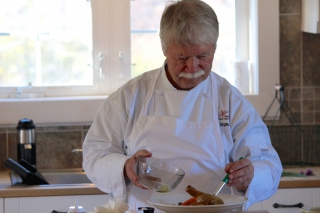
New Year’s Resolution – Take an Inventory of Your Program and Make Necessary Changes
04 December 2016Keep your program relevant by making program assessments and begin the third quarter on a path to success.
By Paul Sorgule, MS, AAC
It’s that time of year, a time to look back and assess where you are and then look forward to where you could be. This is halftime for deans and directors of culinary programs. A chance to take a breath in the locker room, rally the players, look back at missed opportunities, adjust your game plan, and hit the field for a dynamic and successful second half of the academic year. Winning is something that can be interpreted in many different ways, but to a program director – the interpretation will always involve:
- Is our program relevant?
- Are we demanding enough? Is the rigor there?
- Are our students and graduates prepared for success?
- Will all stakeholders agree the program is of good value?
- Are we attracting enough quality students?
- Are we retaining enough quality students?
- Are our faculty members current and prepared to teach what is necessary?
The end of the year and the short break that follows can provide a program’s administration and faculty an opportunity to make some adjustments if the answers to those questions are less than what is required. I would thus encourage you to pull your faculty together before they break for the holidays and pose to them some of the very pertinent questions listed below. These questions will set the stage for third quarter adjustments and more importantly, the answers will assist them in a sweeping commitment to positive change beginning in the spring and carrying through the summer of 2017.
Here is your agenda for that meeting:
- Have we strengthened our connections with industry partners? You know the ones who hire our graduates and help us build the program’s reputation.
- Have we asked our stakeholders, “How are we doing?” These stakeholders include: employers, outside accrediting agencies, faculty, advisory panel members, parents and students. Test the waters – find out what they think. Together you can build strength in your program.
- How are your graduates doing? Are you staying in touch with your students once they walk across the stage? Do you know where they are and what their challenges are? Do your graduates feel comfortable contacting you for advice? Are your faculty still acting as mentors?
- What do your alumni think of the program now that they are out for five or 10 years? Are you asking them to evaluate how well they were prepared? Are you confident in what they will say?
- When was the last time you formally assessed program content and matched it to current needs? Is this built into your school’s calendar? Do you honestly look at everything including how faculty members deliver that content?
- Have you looked at your program through the lens of value? What do you charge for your credits? Is it worth it? Who will determine the program content value?
- What are you doing to ensure your faculty members are current? What are they doing on their own? Active involvement in professional organizations, research, opportunities to stage at restaurants, attending conferences and workshops – what is being done to stay on the cutting edge?
- Are you and your faculty members actively involved in organizations? Are you sitting at the table with the ACF, RCA, Chef’s Collaborative, Slow Food USA, CAFÉ, CHRIE, The Bread Baker’s Guild and others?
- What does your college’s administration think of your program? Have you sat down with them and asked for a serious discussion about the future of the program and how it contributes to the college?
- Are your admissions counselors fully aware of and actively engaged in the program? Do they know enough to be strong advocates for enrollment? Are they excited about what you do?
- How is your brand perceived in the marketplace? Do you keep any analytics, reviews, studies, etc?
- Who are your benchmarks? Do you have a short list of those schools and/or businesses that you want to emulate? Are you investing the time to study them thoroughly?
- What schools are in your competitive set? Do you study them? Do you have comparative notes and a strategy for becoming or remaining competitive?
- Should a student choose you over another competitor? You need to go beyond the typical – small class size, personal attention, etc. What really sets you apart and do potential students know this?
- Why would a chef instructor want to work for your organization? Is it pride in a great school, competitive salaries and benefits, investment in their growth? What can you sell to attract the best faculty?
- Why would a chef choose to hire your graduates over those from another school? Ask them and find out what they are looking for. Communicate and stay involved with placement and respond to their concerns. This is an investment in your brand and the future opportunities and success of your graduates.
You may not come up with answers to all of these questions in that faculty meeting, but this should certainly start them thinking. Your program needs to evolve, self-assess and constantly improve. A program is no different than any other successful business. The process of staying relevant is the same.
Happy Holidays.
Paul Sorgule, MS, AAC, president of Harvest America Ventures, a mobile restaurant incubator based in Saranac Lake, N.Y., is the former vice president of New England Culinary Institute and a former dean at Paul Smith’s College. Contact him at This email address is being protected from spambots. You need JavaScript enabled to view it..
